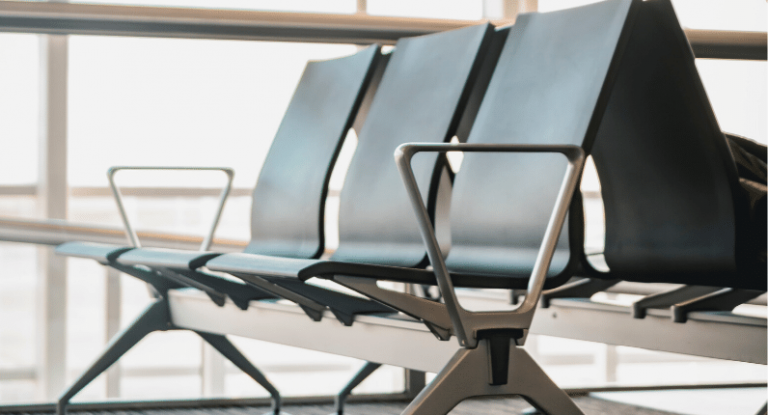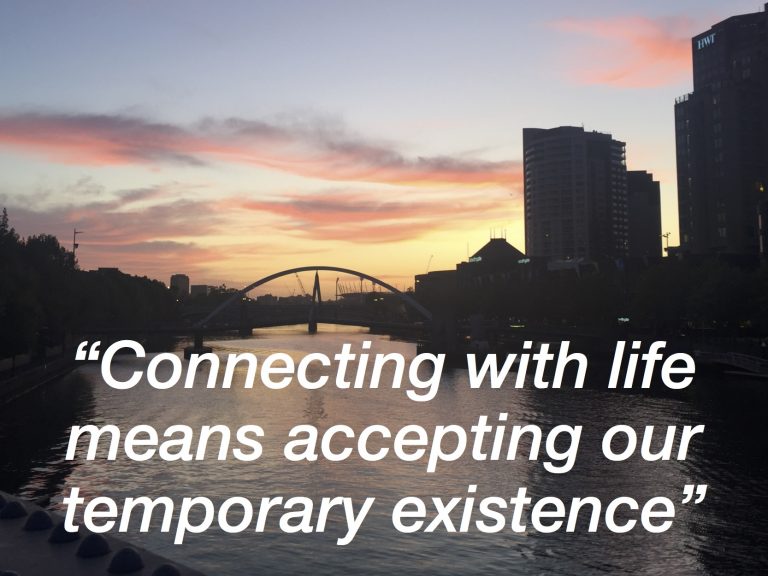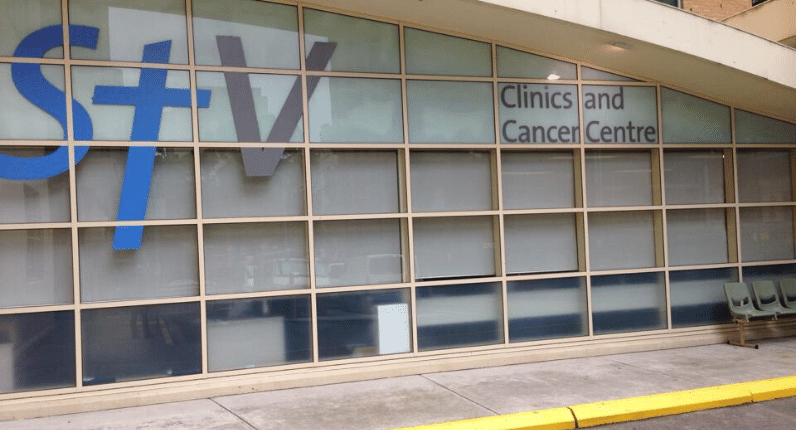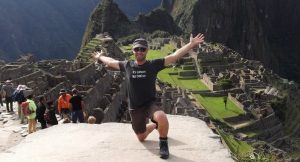I notice the bold letters as I approach the entrance: Cancer Centre. I still feel too young to have cancer, but age is not a qualifier. Cancer doesn’t discriminate. We assume there is a reason behind everything. I had assumed there was a reason behind everything. I lead a healthy lifestyle before being diagnosed, however I pushed boundaries to their limits. Sleep was a low priority – I was too busy living. I thought that I was bulletproof, I was a superhero. There was no reason I would become sick. Cancer though, sees through the arrogance of thinking we know the reason for why everything occurs. There are a thousand plausible reasons why I have cancer. I have no idea which one of them is correct.
Walking through the automatic glass doors into the hospital my world narrows. I focus intensely on the blue line on the old lino as it leads me to the neurosurgery clinic. There’s an avalanche of questions in my head. Questions I have spent months sitting with, unable to come up with an answer. Very few of these questions are for my treatment team. Whether or not the tumour has grown is not the most pressing.
The most pressing questions are ones I need to answer for myself.
How I will cope? There are two possible results. Either the tumour has grown, or there is no change. No change is as positive news as I can be given. I know I’m not going to be told I have been magically cured. Acceptance of that makes it a bit easier. But each result presents its own set of different challenges.
Arriving at the desk, I repeat my UR number from memory. It’s a tell tale sign of how dominated my life has become by hospitals. I can barely remember what I did yesterday, however my UR number seems to be embedded in my brain, just like my tumour, ever ready to be recalled on demand. I find a plastic bucket seat and prepare for the inevitable elongated wait… as if the suspense had not already been built up enough.
The anxiety in the waiting room hangs in the air like a thick smog. I’m not the only one here waiting for results. The room is filled with lost people awaiting their fate. I wonder whose hope will be shattered and who will breathe a sigh of relief.

a ticking time bomb with no idea of the countdown
For the past five days I have been rehearsing my reaction to the results (click here to read about my MRI). If there is no change what will I do? Yes, it will be a good thing but it’s not as simple as that. There will be relief, I know. I am expected to be happy, to feel a huge amount of relief. But in reality it is more complicated than that.
What does “no change” really mean? It means no chemotherapy, no radiotherapy, no surgery. All of these are great things. But it also means I still have a ticking time bomb with no idea of the countdown. The uncertainty continues. At any point in time it might grow. The extra time comes at a high emotional cost. I will have to sit with the knowledge that I still have a terminal diagnosis, grateful as I will be for having that bit longer.
Why am I still alive?
This scenario also raises another question: why am I still alive? The vast majority of people with my diagnosis die in the first 6 months. Why have I made it this far? There is a tremendous amount of guilt around being the survivor. I have many friends (and relatives of friends) who have not made it this far. Why did they not make it? The guilt makes it difficult to talk to my friends and their relatives. To be honest there is also embarrassment about being the survivor. Cancer is more than a disease that affects us on a biological level. It invades its way into everything – our social life, our relationships, our energy, our ability to interact in life. If allowed, the guilt associated with being a survivor can be paralysing. But I fight to not allow it.
And what if there is a change? What if I do need more treatment, more surgery, more chemotherapy, and more radiotherapy? What will I do? Do I have the strength to get through another round of treatment? Can I bet nine months of my life on the possibility of more time? It’s in my nature to love risk, but I am not a gambler.
What if there is a change, and this time, it is too far gone for treatment to work? How will I say goodbye to my family, my friends and my students? What will happen to my mission? What will my legacy be? I guess this is a fool’s game. The idea of leaving a legacy means a little bit of me will continue on beyond the finality of death. It’s a last grab at immortality. Is it really just another way of avoiding confronting death fully? Death is final, but maybe my ideas will continue on and develop into something bigger than I have been able to create so far. My vision is much greater (click here to see my vision). Just helping one child is an achievement in itself, but I see a world where every child believes they have the ability to do the impossible, where they believe they can make our world a better place, a kinder place. This vision is what keeps me going every day through the severe headaches and the extreme exhaustion.
I wait as he brings up the results
My name is called and I am pulled from my contemplation back into the waiting room. I wade through the fog, following the doctor, another surgeon I haven’t met yet. I have lost track of how many surgeons I have seen… seven, eight, maybe more. We walk for what seems like an hour, but was probably about 30 seconds, neither of us saying a word. I ache to ask what the results say but I discipline myself to wait until we reach the consulting room, a pokey white cube with a treatment table and computer. I take the seat next to the computer as the doctor slides into the seat in front of the screen. I wait as he brings up the results.
Finally he looks at me. “Cameron, the scan looks good. We can’t see any changes.” I look at the MRI to confirm what he has just said. I am as surprised as he is. I am one of the odd five percent to make it this far. I have only relatively minor neurological changes, changes I have learned, trained and worked to compensate for, so that the vast majority of people wouldn’t recognise them. The fear and worry about the changes falls away as I realise I have another six months before my next review. I feel like I have cheated death yet again, and a wave of immortality courses through my body. Somehow, maybe because I am short, death has overlooked me and I have managed to sneak out without any more growth. Maybe my inability to grow as a child has been inherited by Timmy (the affectionate nickname by which I call my friendly yet aggressive and invasive brain tumour – read about Timmy here). The sense of immortality is temporary, as reality rises.
The place that previously had been filled with so much anxiety, gives way to the familiar soothing chaos that is our world.
Walking back out into the real world is an experience that is hard to describe. The clinical, white, ordered hospital, void of energy and life, the place that previously had been filled with so much anxiety, gives way to the familiar soothing chaos that is our world. Everything feels so much more intense. The little things provide a huge amount of joy. The doors retract to reveal the amazing sunshine of a Melbourne Spring afternoon, its warm rays filtering down through the trees, immediately warming my body. I feel specks of water from the passing cars on my face as they are carried by the wind. Again I am in awe of the simplest things in life. People walk by me completely oblivious to just how near death we all are. Not only are we oblivious, too scared to contemplate it, but in the hiding from death, we hide from life. We are too scared to be vulnerable enough to really connect with life. Connecting with life means accepting our temporary existence, understanding that as my friend and best selling author Dan Millman would say, “There are no ordinary moments.” That every moment is special, and no moment is any more special than any other. We attach meaning to moments to give ourselves a sense of meaning.

When we let go of this attachment, we stop judging each moment and start experiencing it.
I settle by a tree in the park to take a moment to begin to process what has just happened. This is a habit I do every time. As I appreciate just how lucky I am, I watch the seeds from the tree float on the wind, searching out a new destination to grow. The irony of appreciating the spread of seeds while celebrating the failure of my tumour to continue to grow is not lost on me. Maybe next time I will be pondering how I am going to cope with the treatment, rather than what I am going to do in the next six months. For now though, it’s back to the question I opened with. How do you live life fully present, intently focused on experiencing every second, when you have been waiting for five days for results of whether you are going to live or die? Really what this question is asking is:
How do we live our life fully present in the face of our fears, without denying and hiding from them?
This is a question we all can ask ourselves. This is the ultimate challenge we will all face in our lives. For me, I am finding playing with my fears works best. Playing involves exploring, laughing with the fears, seeing them, talking to them and talking about them. Asking them what they are trying to tell me. This allows me to understand them, and rather than having them control me, I can acknowledge them and still stay on the path I am trying to follow, still chase my vision in the time I do have left.
Thanks for reading! Make sure you live your life!
Cameron Gill
Yes, I have cancer!
Want to learn more about Cameron Gill’s journey, his legacy, and his legacy projects? CLICK HERE for Cam’s official Facebook legacy page. We have heaps more of his story to share, so like and follow to stay updated.



